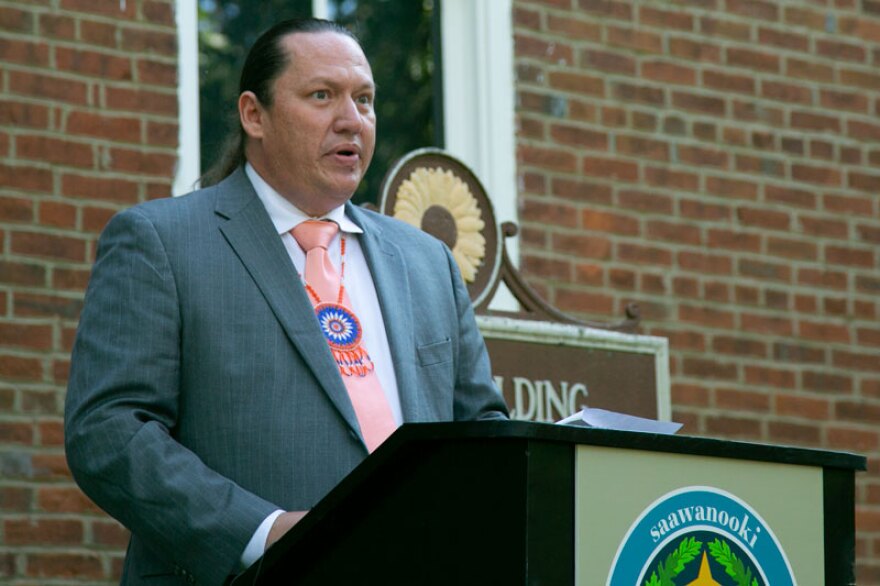The Shawnee Tribe says the state of Kansas should give up ownership of the historic Native American boarding school in Fairway. But this week, the Kaw Nation made an argument that they — as the original inhabitants of the land — should have a say in who controls the site.
A battle is brewing over who should control the Shawnee Indian Mission in Fairway.
Fairway city officials this week pushed back against the Shawnee Tribe’s efforts to take over the historic site and say they have started meeting with Kansas lawmakers to lobby against transferring the land from the control of the state.
Shawnee Tribe officials contend the 12-acre site off Shawnee Mission Parkway, which is owned by the Kansas Historical Society and maintained by the city, is in “deep physical distress” and want to take control, they say, in order to better preserve and maintain it.
But another Native tribe, the Kaw Nation, came out this week against ceding the land to the Shawnee, arguing that they — as the original inhabitants of the land — should have a say in who controls the site.
Here’s where things stand:
‘The risk of losing all the history’
At the Northeast Johnson County Chamber of Commerce’s annual “State of the Cities” luncheon Wednesday, Fairway Mayor Melanie Hepperly called on her fellow municipal leaders in the area to help keep the mission site under state ownership.
Hepperly said the Mission is the most historically significant site in the state and transferring the land to the Shawnee Tribe could jeopardize historic preservation of the grounds.
She asked northeast Johnson County elected officials and other community leaders at the luncheon to advocate with lawmakers for keeping the mission under state control.
“Most importantly, I believe, is the risk of losing all the history of the Shawnee Indian Mission, the Kansas history, 22 tribes worth of history,” Hepperly said.
In an email Thursday, the city of Fairway said Hepperly and City Administrator Nathan Nogelmeier have been meeting with legislators in Topeka to urge them to oppose any land transfer.
The email disputes the Shawnee Tribe’s claims that the mission buildings are in bad shape and also questions whether the tribe has the funding and expertise to carry out preservation efforts.
In particular, the email said Shawnee Chief Ben Barnes “continues to spread blatantly false and misleading statements” about the Mission, the Kansas Historical Society and the Shawnee Indian Mission Foundation, a local nonprofit that helps maintain the site.
Shawnee Tribe wants to keep site ‘open to the public’

The Shawnee Tribe says its tribal business council has committed to a “Save the Shawnee Indian Mission” plan in the event the land is transferred to the tribe.
The $15 million, multi-year plan details a phased approach that would include repairing current structures on the site while also adding a new “interpretive installation” of up to 14,000 square feet, using existing buildings.
The “Save the Shawnee Indian Mission” plan says the Shawnee Tribe is committed to keeping the site “open to the public and operational exclusively as a historic site.”
In an interview with the Post, Chief Barnes refuted the idea that the Tribe would use the land for economic development purposes, including potentially as a casino.
Kathy Bates, the chair of the Shawnee Indian Mission Foundation, told the Post once a transfer of land begins then, “The property when conveyed to a Native tribe becomes sovereign and they are operating then under the laws of the [U.S.] Department of Interior.”
Some things that can happen on sovereign land include housing and economic development, Bates said.
Bates said it could be concerning if the tribe, which would not be accountable to any local authorities, controls the historic site, which sits in the midst of a busy residential and commercial area of northeast Johnson County.
However, Barnes told the Post that all state laws and local regulations would still apply to the land if it were transferred to the Shawnee Tribe.
“We’re not going to be building buildings on the site, we’re not going to be demolishing buildings on the site, we’re going to be fixing buildings on the site,” Barnes said.
Kaw Nation opposes giving land to Shawnee Tribe
In a statement this week, the Kaw Nation said the Shawnee Indian Mission site is located on “aboriginal and treaty lands of the Kaw” and that that Shawnee Tribe only “temporarily occupied” the land when the American government forcibly moved them there for a time before the Civil War.
If the land were to be transferred to any tribal government, then the Kaw Nation believes it should be transferred to them, according to the statement.
The Kaw Nation says it supports restoration of the site and believes a “complete and accurate history” of the site needs to be told — including that of the 22 tribes that sent their children to the Methodist-run school that operate there from 1839 to 1862.
“The Kaw Nation invites leaders of the state of Kansas to work with the leaders of the Kaw Nation to build a cooperative relationship, so that we can have a correct account of our intertwined history,” the statement said.
This story was originally published on the Shawnee Mission Post.
Don’t miss a beat … Click here to sign up for our email newsletters
Click here to learn more about our newsletters first








